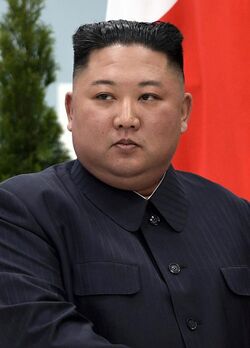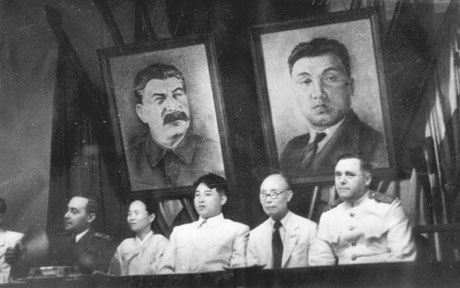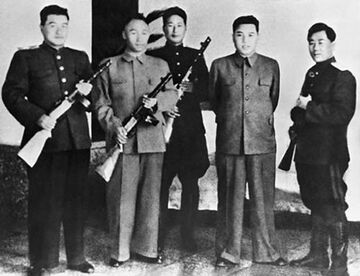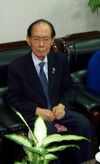Social:List of leaders of North Korea
| Supreme Leader of the Democratic People's Republic of Korea
조선민주주의인민공화국의 최고지도자 | |
|---|---|
 Emblem | |
| Term length | No limit |
| Inaugural holder | Kim Il-sung |
| Formation | 9 September 1948 |
| List of leaders of North Korea | |
| Hangul | 조선민주주의인민공화국의 최고지도자 |
|---|---|
| Hanja | 朝鮮民主主義人民共和國의 最高指導者 |
| Revised Romanization | Joseon Minjujuui Inmin Gonghwagukui Choegojidoja |
This article lists the political leaders of North Korea, officially the Democratic People's Republic of Korea (DPRK).
At the end of World War II, the Soviet Union occupied the northern half of Korea and in 1946 established the Provisional People's Committee for North Korea chaired by Kim Il-sung. On 9 September 1948, the DPRK was proclaimed, also led by Kim Il-sung.
The leaders of the DPRK have been Kim Il-sung, his son Kim Jong-il, and his grandson Kim Jong-Un. In this role they have not held consistent titles, though they were each leaders of the Workers' Party of Korea (WPK)—titled as Chairman from 1948 to 1966, General Secretary from 1966 to 2011, First Secretary from 2011 to 2016, and finally Chairman again since 2016—for almost all of their period in power. Even though they have the appearance of a dynasty, succession is informal.
From 1948 to 1972, the nominal head of state was the Chairman of the Standing Committee of the Supreme People's Assembly (SPA). In 1972, the constitution was amended to create an executive presidency. Kim Il-sung, who had served as Premier of North Korea since the DPRK's inception, was unanimously elected President of North Korea by the Supreme People's Assembly on December 28. He held this office until his death on 8 July 1994 when he was proclaimed the "eternal President of the Republic". Since then, the practical functions of the head of state have been exercised by the President of the Presidium of the SPA.[needs update]
After the death of Kim Il-sung, his son Kim Jong-il was understood to have inherited his father's near-absolute control over the country.[1][2][3] Although he had been his father's designated successor since at least 1991, it took him three years to fully consolidate his power. He was elected general secretary of the party in 1997, and was reelected Chairman of the National Defence Commission (NDC) in 1998. During his rule he was given a range of titles. He ruled the country until his death on 17 December 2011. He was succeeded by his son, Kim Jong-un, who was revealed to be in charge of the country since his father's death by the Rodong Sinmun and finally publicly acknowledged as "Supreme Leader" at the military review ending Kim Jong-il's funeral on 29 December 2011. Who would succeed Kim Jong-un is uncertain and has been speculated upon after health concerns arose in April of 2020.[4]
The government is headed by the Premier of the Cabinet, formerly called Premier of the Administration Council.
Other important institutions include the SPA, whose sessions are chaired by the Chairman of the Supreme People's Assembly, and, since 1993, the Chairman of the NDC–since 2016, known as the State Affairs Commission–which holds supreme command of the DPRK's armed forces.
While two other parties, the Korean Social Democratic Party and the Chondoist Chongu Party, nominally exist, only the WPK holds any power at the national level. The other parties, and indeed all other mass organizations in the country, are completely subservient to the WPK. Almost nothing is mentioned about the minor parties except the names of their current leaders.[5]
Since 1997, the SPA chairman, premier and NDC/SAC chairman have officially formed a triumvirate heading the executive branch, with powers equivalent to one-third of a president's powers in other presidential systems. The SPA chairman conducts foreign affairs and receives the credentials of ambassadors, the premier handles domestic policy and the NDC/SAC chairman commands the armed forces. In practice, however, the real power is vested in the SAC chairman (who has also been leader of the WPK), an office constitutionally defined as the "highest post in the state”.
Supreme Leader of North Korea
All supreme leaders of North Korea hold the positions of leader of the Workers' Party of Korea and supreme commander of the Korean People's Army. The Constitution of North Korea has officially recognized the title "Supreme Leader" since 2009, when the chairman of the National Defence Commission (and as of 2016 when it was replaced by chairman of the State Affairs Commission) was formally designated as the "supreme leader of the Democratic People's Republic of Korea" (Korean: 조선민주주의인민공화국의 최고 지도자).[6][7][8] <timeline> ImageSize = width:875 height:auto barincrement:16 PlotArea = top:10 bottom:80 right:130 left:20 AlignBars = late
DateFormat = dd/mm/yyyy Period = from:01/01/1948 till:01/01/2021 TimeAxis = orientation:horizontal ScaleMinor = unit:year increment:1 start:1948 ScaleMajor = unit:year increment:5 start:1950
BarData =
barset:PM
PlotData=
width:5 align:left fontsize:S shift:(5,-4) anchor:till barset:PM
from: 09/09/1948 till: 08/07/1994 color:red text:"Kim Il-sung" fontsize:10 from: 08/07/1994 till: 17/12/2011 color:blue text:"Kim Jong-il" fontsize:10 from: 17/12/2011 till: 01/04/2020 color:green text:"Kim Jong-un" fontsize:10
</timeline>
Generations of leadership
First generation Second generation Third generation
- Bold offices refer to the highest positions in North Korea
| Picture | Name | Offices held | Period | Ideology | |
|---|---|---|---|---|---|
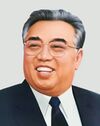
|
Kim Il-sung 김일성 (1912–1994) | ||||
| Supreme Commander of the KPA | 8 February 1948 – 24 December 1991 | 9 September 1948 ↓ 8 July 1994 † (45 years, 302 days) |
Juche (Ten Principles) | ||
| Premier of the Cabinet of the DPRK | 9 September 1948 – 28 December 1972 | ||||
| Chairman of the Central Committee of the WPK | 30 June 1949 – 11 October 1966 | ||||
| Chairman of the Central Military Commission of the WPK | 26 June 1950 – 8 July 1994 | ||||
| General Secretary of the Central Committee of the WPK | 11 October 1966 – 8 July 1994 | ||||
| President of the DPRK | 28 December 1972 – 8 July 1994 | ||||
| Chairman of the National Defence Commission of the DPRK | 28 December 1972 – 9 April 1993 | ||||
| Eternal President of the DPRK | 5 September 1998 – present | ||||

|
Kim Jong-il 김정일 (1941–2011) | ||||
| Supreme Commander of the KPA | 24 December 1991 – 17 December 2011 | 8 July 1994 ↓ 17 December 2011 † (17 years, 162 days) |
Juche Songun (Ten Principles) | ||
| Chairman of the National Defence Commission of the DPRK | 9 April 1993 – 17 December 2011 | ||||
| General Secretary of the WPK | 8 October 1997 – 17 December 2011 | ||||
| Chairman of the Central Military Commission of the WPK | |||||
| Eternal General Secretary of the WPK | 11 April 2012 – present | ||||
| Eternal Chairman of the National Defence Commission of the DPRK | 13 April 2012 – present | ||||
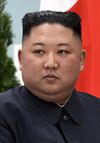
|
Kim Jong-un 김정은 (born 1983) | ||||
| Supreme Commander of the KPA | 30 December 2011 – present | 17 December 2011 ↓ Incumbent (13 years, 362 days) | |||
| First Secretary of the WPK | 11 April 2012 – 9 May 2016 | ||||
| Chairman of the Central Military Commission of the WPK | 11 April 2012 – present | ||||
| First Chairman of the National Defence Commission of the DPRK | 13 April 2012 – 29 June 2016 | ||||
| Chairman of the WPK | 9 May 2016 – present | ||||
| Chairman of the State Affairs Commission | 29 June 2016 – present | ||||
| Supreme Representative of the Korean People | April 2019 – present | ||||
Leaders of the Workers' Party of Korea (WPK)

| No. | Picture | Name (Birth–Death) |
Took office | Left office | Political party |
|---|---|---|---|---|---|
| Chairman | |||||
| style="background:Template:Workers' Party of Korea/meta/color; color:white;" | 1 | Kim Tu-bong (1889–1958) |
28 August 1946 | 30 June 1949 | WPNK | |
| Chairman of the Central Committee | |||||
| style="background:Template:Workers' Party of Korea/meta/color; color:white;" | 2 |  |
Kim Il-sung (1912–1994) |
30 June 1949 | 11 October 1966 | WPK |
| General Secretary of the Central Committee | |||||
| style="background:Template:Workers' Party of Korea/meta/color; color:white;" | (2) |  |
Kim Il-sung (1912–1994) |
11 October 1966 | 8 July 1994 | WPK |
| General Secretary of the Party | |||||
| style="background:Template:Workers' Party of Korea/meta/color; color:white;" | 3 |  |
Kim Jong-il (1941–2011) |
8 October 1997 | Incumbent (see explanation below) |
WPK |
| First Secretary of the Party | |||||
| style="background:Template:Workers' Party of Korea/meta/color; color:white;" | 4 |  |
Kim Jong-un (born 1983) |
11 April 2012 | 9 May 2016 | WPK |
| Chairman of the Party | |||||
| style="background:Template:Workers' Party of Korea/meta/color; color:white;" | (4) |  |
Kim Jong-un (born 1983) |
9 May 2016 | Incumbent | WPK |
Kim Jong-il died on 17 December 2011, but has since been posthumously named the "Eternal General Secretary". Thus his son and successor as leader, Kim Jong-un, was not given the title of General Secretary.
Heads of state
| No. | Picture | Name (Birth–Death) |
Took office | Left office | Political party |
|---|---|---|---|---|---|
| Chairman of the Standing Committee of the Supreme People's Assembly | |||||
| style="background:Template:Workers' Party of Korea/meta/color; color:white;" | 1 | Kim Tu-bong (1889–1958) |
9 September 1948 | 20 September 1957 | WPNK / WPK | |
| style="background:Template:Workers' Party of Korea/meta/color; color:white;" | 2 | Choe Yong-gon (1900–1976) |
20 September 1957 | 28 December 1972 | WPK | |
| President of the Republic | |||||
| style="background:Template:Workers' Party of Korea/meta/color; color:white;" | 3 |  |
Kim Il-sung (1912–1994) |
28 December 1972 | 8 July 1994 (see explanation below) |
WPK |
| Vacant (8 July 1994–5 September 1998) | |||||
| President of the Presidium of the Supreme People's Assembly | |||||
| style="background:Template:Workers' Party of Korea/meta/color; color:white;" | 4 | Kim Yong-nam (born 1928) |
5 September 1998 | 11 April 2019 | WPK | |
| style="background:Template:Workers' Party of Korea/meta/color; color:white;" | 5 |  |
Choe Ryong-hae (born 1950) |
11 April 2019 | Incumbent | WPK |
| Supreme Leader of the Democratic People's Republic of Korea | |||||
| style="background:Template:Workers' Party of Korea/meta/color; color:white;" | — |  |
Kim Jong-il (1941-2011) |
9 April 2009 | 17 December 2011 | WPK |
| style="background:Template:Workers' Party of Korea/meta/color; color:white;" | — |  |
Kim Jong-un (born 1984) |
8 March 2012 | Incumbent | WPK |
Kim Il-sung died on 8 July 1994, but in 1998 was named the "eternal President of the Republic". Thus his son and successor as leader, the late Kim Jong-il, did not assume the post of head of state until April 2009 and the President of the Presidium of the Supreme People's Assembly became recognised as the de facto head of state.
Heads of government
| No. | Picture | Name (Birth–Death) |
Took office | Left office | Political party |
|---|---|---|---|---|---|
| Premier of the Cabinet | |||||
| style="background:Template:Workers' Party of Korea/meta/color; color:white;" | 1 |  |
Kim Il-sung (1912–1994) |
9 September 1948 | 28 December 1972 | WPNK / WPK |
| Premier of the Administration Council | |||||
| style="background:Template:Workers' Party of Korea/meta/color; color:white;" | 2 |  |
Kim Il (1910–1984) |
28 December 1972 | 29 April 1976 | WPK |
| style="background:Template:Workers' Party of Korea/meta/color; color:white;" | 3 |  |
Pak Song-chol (1913–2008) |
19 April 1976 | 16 December 1977 | WPK |
| style="background:Template:Workers' Party of Korea/meta/color; color:white;" | 4 |  |
Ri Jong-ok (1916–1999) |
16 December 1977 | 27 January 1984 | WPK |
| style="background:Template:Workers' Party of Korea/meta/color; color:white;" | 5 | Kang Song-san (1931–2007) |
27 January 1984 | 29 December 1986 | WPK | |
| style="background:Template:Workers' Party of Korea/meta/color; color:white;" | 6 | Ri Kun-mo (1926–2001) |
29 December 1986 | 12 December 1988 | WPK | |
| style="background:Template:Workers' Party of Korea/meta/color; color:white;" | 7 | Yon Hyong-muk (1931–2005) |
12 December 1988 | 11 December 1992 | WPK | |
| style="background:Template:Workers' Party of Korea/meta/color; color:white;" | 8 | Kang Song-san (1931–2007) |
11 December 1992 | 21 February 1997 | WPK | |
| style="background:Template:Workers' Party of Korea/meta/color; color:white;" | — | Hong Song-nam (1929–2009) Acting Premier |
21 February 1997 | 5 September 1998 | WPK | |
| Premier of the Cabinet | |||||
| style="background:Template:Workers' Party of Korea/meta/color; color:white;" | 9 | Hong Song-nam (1929–2009) |
5 September 1998 | 3 September 2003 | WPK | |
| style="background:Template:Workers' Party of Korea/meta/color; color:white;" | 10 |  |
Pak Pong-ju (born 1939) |
3 September 2003 | 11 April 2007 | WPK |
| style="background:Template:Workers' Party of Korea/meta/color; color:white;" | 11 |  |
Kim Yong-il (born 1944) |
11 April 2007 | 7 June 2010 | WPK |
| style="background:Template:Workers' Party of Korea/meta/color; color:white;" | 12 |  |
Choe Yong-rim (born 1930) |
7 June 2010 | 1 April 2013 | WPK |
| style="background:Template:Workers' Party of Korea/meta/color; color:white;" | 13 |  |
Pak Pong-ju (born 1939) |
1 April 2013 | 12 April 2019 | WPK |
| style="background:Template:Workers' Party of Korea/meta/color; color:white;" | 14 |  |
Kim Jae-ryong (born ???) |
12 April 2019 | Incumbent | WPK |
Heads of parliament
| No. | Picture | Name (Birth–Death) |
Took office | Left office | Political party |
|---|---|---|---|---|---|
| Chairman of the Standing Committee of the Supreme People's Assembly | |||||
| style="background:Template:Workers' Party of Korea/meta/color; color:white;" | 1 | Kim Tu-bong (1889–1958) |
9 September 1948 | 20 September 1957 | WPNK / WPK | |
| style="background:Template:Workers' Party of Korea/meta/color; color:white;" | 2 | Choe Yong-gon (1900–1976) |
20 September 1957 | 28 December 1972 | WPK | |
| style="background:Template:Workers' Party of Korea/meta/color; color:white;" | 3 | Hwang Jang-yop (1923–2010) |
28 December 1972 | 1983 | WPK | |
| style="background:Template:Workers' Party of Korea/meta/color; color:white;" | 4 | Error creating thumbnail: Unable to save thumbnail to destination | Yang Hyong-sop (born 1925) |
1983 | 5 September 1998 | WPK |
| Chairman of the Supreme People's Assembly | |||||
| style="background:Template:Workers' Party of Korea/meta/color; color:white;" | 5 |  |
Choe Thae-bok (born 1930) |
5 September 1998 | 11 April 2019 | WPK |
| style="background:Template:Workers' Party of Korea/meta/color; color:white;" | 6 |  |
Pak Thae-song (born 1955) |
11 April 2019 | Incumbent | WPK |
Heads of the military

| No. | Picture | Name (Birth–Death) |
Took office | Left office | Political party |
|---|---|---|---|---|---|
| Chairman of the Central Military Commission of the Workers' Party of Korea | |||||
| style="background:Template:Workers' Party of Korea/meta/color; color:white;" | 1 |  |
Kim Il-sung (1912–1994) |
26 June 1950 | 28 December 1972 | WPK |
| Chairman of the National Defence Commission | |||||
| style="background:Template:Workers' Party of Korea/meta/color; color:white;" | (1) |  |
Kim Il-sung (1912–1994) |
28 December 1972 | 9 April 1993 | WPK |
| style="background:Template:Workers' Party of Korea/meta/color; color:white;" | 2 |  |
Kim Jong-il (1941–2011) |
9 April 1993 | 17 December 2011 (see explanation below) |
WPK |
| First Chairman of the National Defence Commission | |||||
| style="background:Template:Workers' Party of Korea/meta/color; color:white;" | 3 |  |
Kim Jong-un (1983-) |
13 April 2012 | 29 June 2016 | WPK |
| Chairman of the State Affairs Commission | |||||
| style="background:Template:Workers' Party of Korea/meta/color; color:white;" | (3) |  |
Kim Jong-un (1983-) |
29 June 2016 | Incumbent | WPK |
Kim Jong-il died on 17 December 2011, but has since been posthumously named the "Eternal Chairman of the National Defence Commission". Thus his son and successor as leader, Kim Jong-un, was given the title of "First Chairman".
See also
- Eternal leaders of North Korea
- Government of North Korea
- Kim dynasty
- North Korean cult of personality
- Politics of North Korea
- Residences of North Korean leaders
- Vice President of North Korea
References
- ↑ Barry Turner (2013). The Statesman's Yearbook 2014: The Politics, Cultures and Economies of the World. Springer. p. 746. ISBN 978-1-349-59643-0. https://books.google.com/books?id=r5PlDQAAQBAJ&pg=PA746. "However, it is widely understood that Kim, like his late father, yields absolute power over the state, party and army."
- ↑ Korea Focus on Current Topics. Korea Foundation. 2000. pp. 109–110. https://books.google.com/books?id=rnSGAAAAIAAJ. "Kim Jong-il exercises near absolute power based on juche thought and respect for his revolutionary legacy."
- ↑ Economic Research Institute for Northeast Asia (1999). Japan and Russia in Northeast Asia: Partners in the 21st Century. Greenwood Publishing Group. p. 138. ISBN 978-0-275-96382-8. https://books.google.com/books?id=uPI9vkyisXMC&pg=PA138. "On February 14, 1974, Kim Il Sung announced the ten major principles to the party leadership, thus forcing power rivals to accept his "divinity, absolutism, and unconditionality" as was articulated in the principles. As a result, one may consider Kim Jong Il's control over North Korea, at least for the time being, as absolute, because he has made it almost impossible to openly advocate ideas directed against his father or express discontent with the system."
- ↑ "Kim Jong-un: Who might lead N Korea without Kim?". https://www.bbc.com/news/world-asia-52450744.
- ↑ Savada, Andrea Matles. "Mass Organizations." North Korea: A country study. Washington: GPO for the Library of Congress, 1993.
- ↑ Petrov, Leonid (12 October 2009). "DPRK has quietly amended its Constitution". Leonid Petrov's KOREA VISION. https://leonidpetrov.wordpress.com/2009/10/12/dprk-has-quietly-amended-its-constitution/. Retrieved 12 September 2015.
- ↑ Isozaki, Atsuhito. "North Korea Revamps Its Constitution". DIPLOMAT MEDIA INC.. https://thediplomat.com/2019/08/north-korea-revamps-its-constitution/. Retrieved 27 April 2020.
- ↑ "Article 100" (PDF). Socialist Constitution of the Democratic People's Republic of Korea. Amended and supplemented on April 1, Juche 102 (2013), at the Seventh Session of the Twelfth Supreme People's Assembly. Pyongyang: Foreign Languages Publishing House. 2014. p. 22. ISBN 978-9946-0-1099-1. http://www.naenara.com.kp/en/book/download.php?4+4047.
External links
